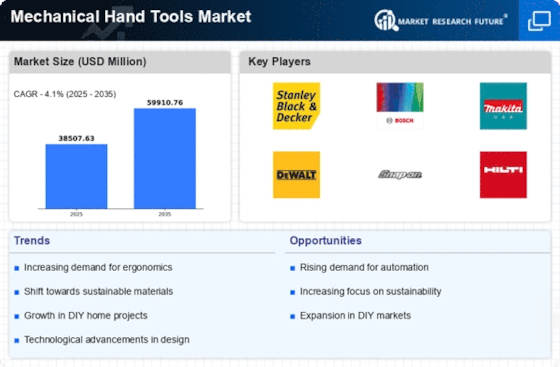Top Industry Leaders in the Mechanical Hand Tools market

*Disclaimer: List of key companies in no particular order
Top listed global companies in the industry are:
- Klein Tools (US)
- Stanley Black & Decker, Inc (US)
- Wurth Group (Germany)
- Hilti Corporation (Liechtenstein)
- Snap-on (US)
- Makita Corporation (US)
- TOYA SA (Poland)
- Techtronic Industries Co. Ltd (Hong Kong)
- Metabowerke GmbH (Germany), among others.
Gripping the Market: Navigating the Competitive Landscape of Mechanical Hand Tools
The global mechanical hand tools market is a bustling arena where established players and nimble innovators wrestle for dominance. Understanding the strategies shaping this competition, the factors defining market share, and emerging trends is crucial for securing a firm grasp on this dynamic landscape.
Key Players and their Strategies:
- Global Titans: Giants like Stanley Black & Decker and Snap-on Incorporated leverage their extensive product portfolios, brand recognition, and distribution networks to maintain a significant market share. Stanley Black & Decker caters to diverse user needs with its Craftsman and DeWalt brands, while Snap-on focuses on high-end professional tools.
- Regional Champions: Companies like Tajima and Bahco excel in specific geographies by tailoring solutions to regional preferences and price points. Tajima dominates Japan with its focus on ergonomic comfort and innovative designs, while Bahco caters to European markets with its emphasis on durability and precision.
- Niche Specialists: Companies like Knipex and Wiha carve out dedicated segments with specialized tool offerings. Knipex focuses on pliers and cutting tools for specific trades, while Wiha excels in screwdrivers and precision tools for electronics and delicate tasks.
Factors for Market Share Analysis:
- Product Breadth and Depth: Offering a wide range of tools for diverse applications (hand tools, power tools, specialty tools) expands market reach and attracts varied customer segments.
- Brand Recognition and Reputation: Established brands like Stanley Black & Decker benefit from trust built over decades, while niche players like Knipex gain recognition through quality and specialization.
- Innovation and Ergonomics: Integrating innovative features like multi-functionality, interchangeable blades, and ergonomic designs enhances user experience and attracts professionals. Tajima's ergonomic wrenches exemplify this.
- Cost-Effectiveness and Value Proposition: Balancing features with affordability is crucial, especially in price-sensitive segments. Tajima's cost-effective tools cater to emerging markets, while Bahco offers durable tools for long-term value.
Emerging Trends and Company Strategies:
- Smart Tools and Connectivity: Integrating sensors and communication modules into tools enables real-time performance monitoring, predictive maintenance, and data-driven tool selection. Stanley Black & Decker's connected tool ecosystem exemplifies this trend.
- Focus on Sustainability: Using eco-friendly materials, reducing packaging waste, and offering tools with extended lifespans are gaining traction. Wiha's focus on durable tools embodies this approach.
- Direct-to-Consumer Sales: Bypassing traditional distribution channels and selling directly to customers online allows for greater control over pricing and brand messaging. Bahco's growing online presence exemplifies this trend.
- Focus on Specific Trades and Applications: Tailoring toolkits and solutions to specific trades like electricians, plumbers, and mechanics attracts targeted customer segments and fosters brand loyalty. Knipex's electrician toolkits illustrate this approach.
Overall Competitive Scenario:
The mechanical hand tools market presents a dynamic scene where global giants vie for market share with regional champions and niche specialists. Success hinges on offering diverse product portfolios, embracing continuous innovation, prioritizing ergonomics and sustainability, and adapting to emerging trends like smart tools and direct-to-consumer sales. Companies demonstrating agility, value proposition, and a commitment to specific user needs hold a strong hand in this market.
Latest Company Updates:
November 2023: Klein Tools, an industry leader in hand tools and equipment designed for professionals, is ecstatic to declare the introduction of the TI290 Rechargeable Pro Thermal Imager with WiFi. As well as HVAC engineers and surveyors, this innovative addition to our product line is poised to transform thermal imaging for industrial, commercial, and residential users. With the capability to identify hot and cold regions in a temperature range of -20 °C to 400 °C, the TI290 Rechargeable Pro Thermal Imager enables users to locate malfunctions and inefficiencies in mechanical equipment, electrical systems, and more with speed and precision. This thermal imager's cutting-edge WiFi functionalities enable seamless thermal image capture, storage, and sharing, rendering it an essential instrument for professionals requiring to collaborate with peers or communicate discoveries to clients.
July 2023: The Australian government awarded Koodaideri Innovation and Technology (KIT) nearly $1 million in July 2023 for the development of a device and application that enable mechanics to remotely service heavy machinery. The grant will be utilized to integrate 3D metal printing into manufacturing processes, enabling the customization of the SafeAdjust device for thousands of machinery in industries including shipping, oil and gas, and agriculture. HydraTune, which has developed a wireless hydraulic tuning system that enables technicians to modify machinery from a distance of up to 100 meters using an application, is owned by KIT. SafeAdjust is a hardware product manufactured in Perth by the company. It consists of a sequence of actuators and adapters and is utilized to adjust equipment that is under the control of the application.










